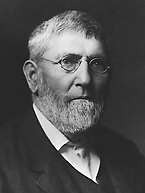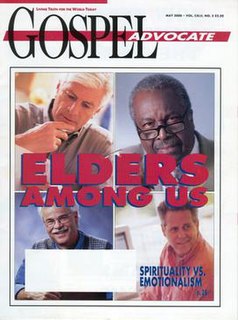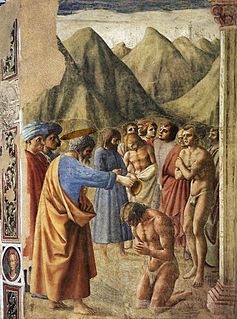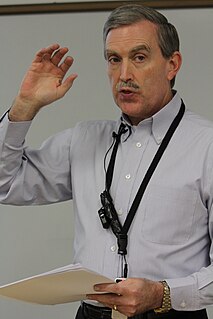Austin McGary (February 6, 1846 – June 15, 1928) was an American Restoration Movement evangelist and publisher of a periodical entitled Firm Foundation , which was first published on September 1, 1884.

The Restoration Movement is a Christian movement that began on the United States frontier during the Second Great Awakening (1790–1840) of the early 19th century. The pioneers of this movement were seeking to reform the church from within and sought "the unification of all Christians in a single body patterned after the church of the New Testament." Especially since the mid-20th century, members of these churches do not identify as Protestant but simply as Christian.
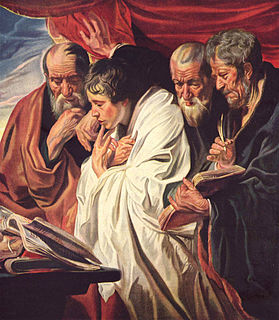
In Christianity, evangelism is the commitment to or act of publicly preaching (ministry) of the Gospel with the intention of spreading the message and teachings of Jesus Christ.
The Firm Foundation was a religious periodical published monthly in Houston, Texas, for members of the Churches of Christ. It was established in 1884 by Austin McGary. The Firm Foundation was, for the next hundred years, one of the two most influential publications among the Churches of Christ along with the Gospel Advocate.
Contents
- Texas lawman
- Personal life
- Evangelist, publisher, debater
- Rebaptism controversy
- Later life
- References
- External links
Born in Huntsville, Texas, to Isaac and Elizabeth (Visier) McGary, McGary's father was said to have fought at the Battle of San Jacinto and to have guarded the recently captured Antonio López de Santa Anna. McGary's mother died while McGary was a child.

Huntsville is a city in and the county seat of Walker County, Texas. The population was 38,548 as of the 2010 census. It is the center of the Huntsville micropolitan area.

The Battle of San Jacinto, fought on April 21, 1836, in present-day Harris County, Texas, was the decisive battle of the Texas Revolution. Led by General Sam Houston, the Texian Army engaged and defeated General Antonio López de Santa Anna's Mexican army in a fight that lasted just 18 minutes. A detailed, first-hand account of the battle was written by General Houston from Headquarters of the Texian Army, San Jacinto, on April 25, 1836. Numerous secondary analyses and interpretations have followed, several of which are cited and discussed throughout this entry.

Antonio de Padua María Severino López de Santa Anna y Pérez de Lebrón, often known as Santa Anna or López de Santa Anna, was a Mexican politician and general who fought to defend royalist New Spain and then for Mexican independence. He greatly influenced early Mexican politics and government, and was an adept soldier and cunning politician, who dominated Mexican history in the first half of the nineteenth century to such an extent that historians often refer to it as the "Age of Santa Anna". He was called "the Man of Destiny", who "loomed over his time like a melodramatic colossus, the uncrowned monarch." Santa Anna first opposed the movement for Mexican independence from Spain, but then fought in support of it. Though not the first caudillo of modern Mexico, he "represents the stereotypical caudillo in Mexican history," and among the earliest. Conservative historian, intellectual, and politician Lucas Alamán wrote that "The history of Mexico since 1822 might accurately be called the history of Santa Anna's revolutions.... His name plays the major role in all the political events of the country and its destiny has become intertwined with his."





